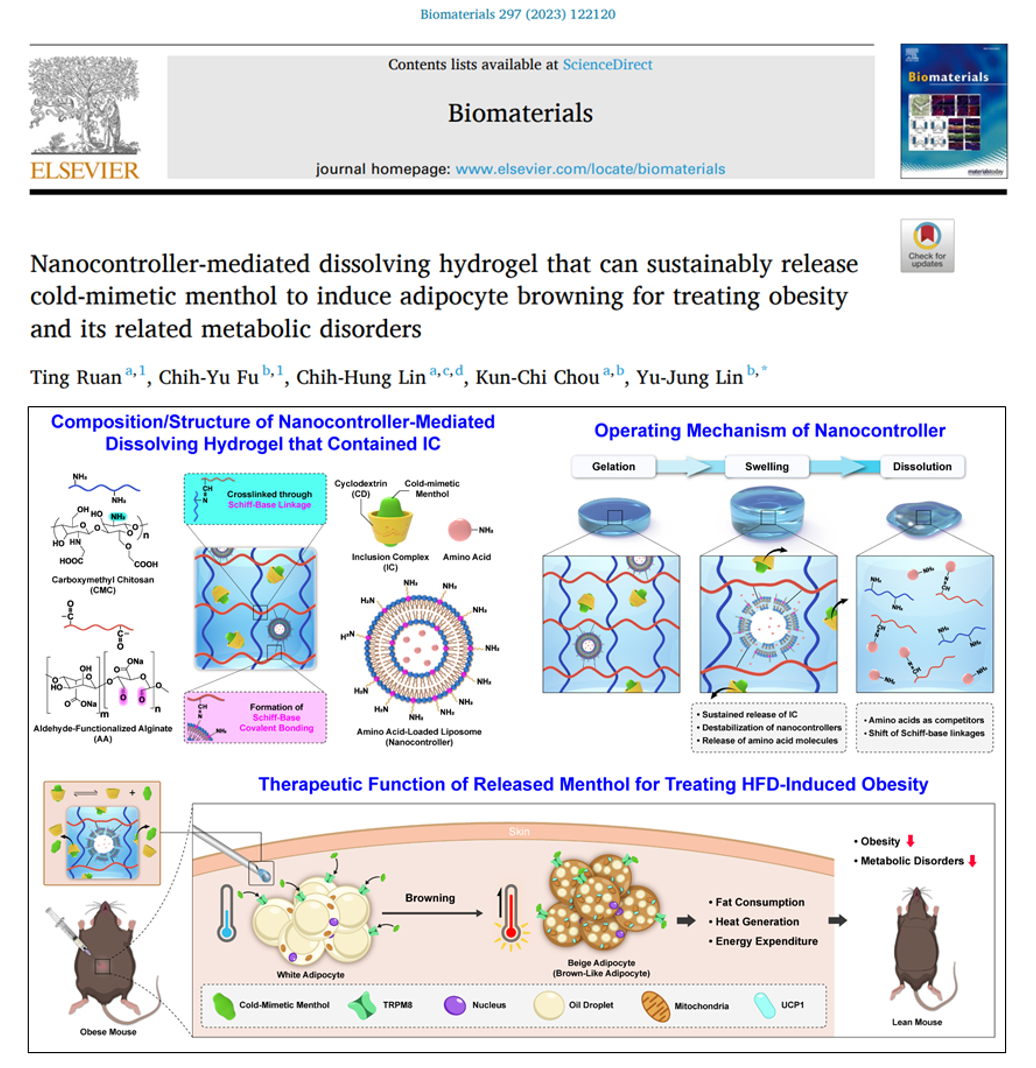Combating Obesity: A Menthol Sustained-Release Platform for Inducing Adipocyte Browning
Dr. Yu-Jung Lin, an Assistant Research Fellow at RCAS, collaborates with her laboratory staff and partners, including
Professor Ting Ruan from the School of Medicine at Fu Jen Catholic University and Dr. Chih-Hung Lin from Cathay General Hospital. Together, they have successfully developed a dissolving hydrogel capable of sustaining the release of menthol.
The released menthol can transform energy-storing white adipocytes into energy-consuming beige adipocytes, thereby reducing body weight and improving metabolic disorders associated with obesity. Due to its volatile nature and poor water solubility, frequent administrations of menthol is typically necessary to achieve therapeutic concentrations. However, the sustained-release platform developed in this study significantly reduces the frequency of menthol administration.
Additionally, the design of the dissolving hydrogel allows it to dissolve at the site of administration
after releasing its payloads, thus minimizing potential side effects resulting from foreign substances in the body. Obesity and metabolic diseases can be regarded as civilization-related ailments, and our research findings introduce innovative treatment concepts in this field. In addition to the well-established 'eat less, move more' approach to weight loss, the regulation of adipocyte subtypes or functions also holds promise as a strategic approach.
Summary of Achievement
We successfully developed a dissolving hydrogel capable of sustaining the release of menthol. The released menthol can transform energy-storing white adipocytes into energy-consuming beige adipocytes, thereby reducing body weight and improving metabolic disorders associated with obesity.
New Discovery or Breakthrough
Due to its volatile nature and poor water solubility, frequent administrations of menthol is typically necessary to achieve therapeutic concentrations. However, the sustained-release platform developed in this study significantly reduces the frequency of menthol administration. Additionally, the design of the dissolving hydrogel allows it to dissolve at the site of administration after releasing its payloads, thus minimizing potential side effects resulting from foreign substances in the body.
Motivation
It all began with seeing news reports stating that it is easier to succeed in weight loss during the winter. We found this intriguing, so we delved deeper to explore the possible regulatory mechanisms. As a result, we discovered that the subtypes (functions) of adipocytes can be regulated by low temperatures. However, regulating adipocytes through changes in environmental temperature in the human body (or animals) poses certain difficulties since we cannot realistically ask participants to constantly be in a cold environment.
Menthol is often added to everyday products, such as toothpaste, or food items, like chewing gum, to provide a cooling
sensation. This is because menthol can stimulate and cold receptors in the body. Interestingly, these same cold receptors are present on adipocytes. Therefore, we were inspired to develop a sustained-release platform for delivering menthol to mimic the effects of low temperatures, thereby regulating adipocytes.
Working Footprint
This project, from conceptualization of the topic, preparation of the sustained-release platform, validation through cell and animal experiments, result analysis, and manuscript preparation, took approximately a little over two years.
Collaborators
This experiment involved close collaboration with Professor Ting Ruan from the School of Medicine at Fu Jen Catholic University. She has a deep understanding of the physiological and pathological mechanisms related to cold receptors and provided us with valuable insights and suggestions.
Breakthrough Methodology
Due to its volatile nature and poor water solubility, frequent administrations of menthol is typically necessary to achieve therapeutic concentrations. However, the sustained-release platform developed in this study significantly reduces the frequency of menthol administration. Additionally, the design of the dissolving hydrogel allows it to dissolve at the site of administration after releasing its payloads, thus minimizing potential side effects resulting from foreign substances in the body.
Difficulties
Because establishing an obesity mouse model involves prolonged feeding of a high-fat diet, coupled with the time required for drug administration, each batch of animal experiments typically takes more than three months to yield preliminary results. In this study, we established a total of five batches of animal models to complete the relevant experiments. This can be quite stressful for researchers, as we must meticulously design experimental groups and set drug dosages. Therefore, we spent a considerable amount of time brainstorming on paper, preemptively considering all possible scenarios.
Applications
Obesity and metabolic diseases can be regarded as civilization-related ailments, and our research findings introduce innovative treatment concepts in this field. In addition to the well-established 'eat less, move more' approach to weight loss, the regulation of fat cell subtypes or functions also holds promise as a strategic approach.
Acknowledgement
I would like to express my gratitude to all the authors of this paper. The experimental content of this research was quite complex, spanning from platform design, material characterization, cell experiments, to animal model validation. It required the utilization of various experimental techniques in fields such as chemistry, chemical engineering, physiology, molecular biology, and more. Thanks to all the authors for their willingness to step beyond their familiar research domains and for their patience in participating in this study.
Future Directions
In addition to regulating adipocytes, cold receptors actually play important roles in many physiological mechanisms (such as heatstroke or asthma, etc.). Therefore, we will develop various menthol delivery platforms to simulate the effects of low temperatures on cold receptors for application in different disease models.
